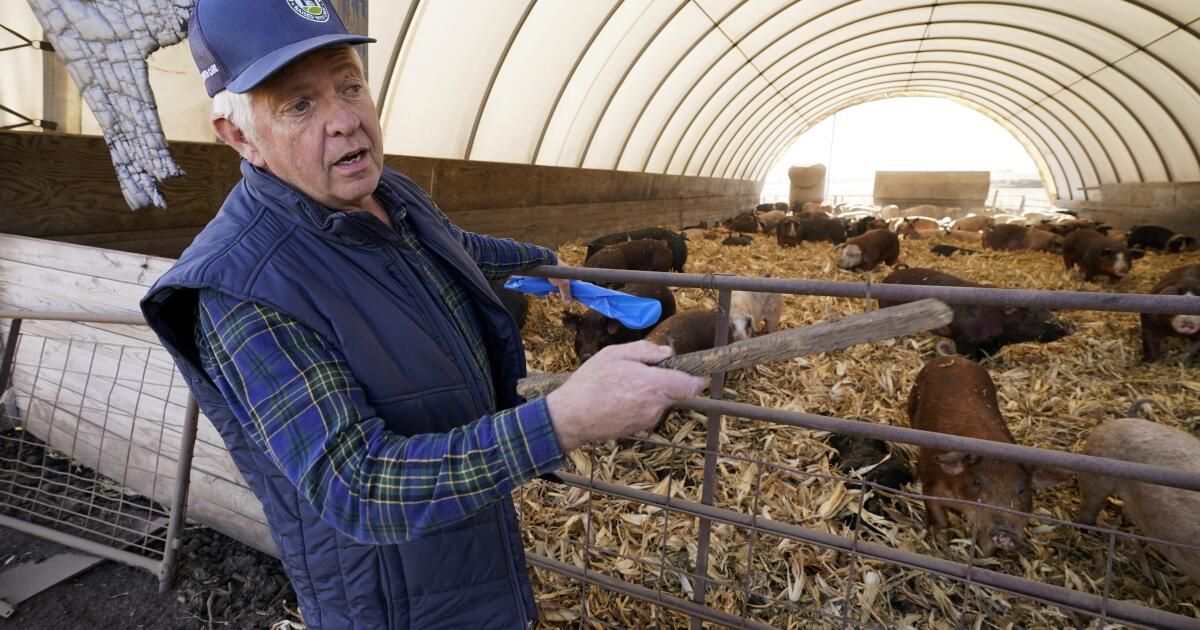For most pregnant sows on large U.S. factory farms, every four months of gestation takes place in a tiny cage. Sows can stand up but cannot turn around or take more than a couple of steps. The floor slats allow waste to fall, but that does not prevent its ammonia smell from constantly enveloping them.
Sows trapped in these cages sometimes obsessively bite the metal bars and suffer from foot and leg disorders. After gestation, the sows are placed in farrowing pens where they nurse the piglets for a few weeks. Then it is returned to the gestation cage for artificial insemination and the whole process begins again.
Locking animals in cages is one of the cruelest practices on factory farms, which is also perpetrated against laying hens and calves. Over the past 15 years, many of these animals have been released from their crowded environments thanks to state laws and ballot measures, such as Proposition 12 in California, driven by a growing consumer revulsion toward food that comes from poorly treated animals.
Since then, dozens of grocery retailers and food companies have pledged to get sows out of cages. Nine years ago, Walmart joined the chorus and asked its suppliers to remove sows from cramped cages as part of broad animal welfare guidelines.
The big-box retailer accounts for about a quarter of U.S. grocery sales and this would have been a significant animal welfare measure, but Walmart never mandated these changes or set benchmarks or deadlines for its suppliers. At the time, the editorial board was concerned that Walmart simply asking would not be enough to pressure suppliers to make the necessary farm and barn modernization.
And it doesn't seem like that. Walmart won't say how much of the pork it sells comes from operations where pregnant sows are completely out of cages or crates for most of the gestation period. If it had made significant progress in sourcing pork from operations where the sows are mostly cage-free, it's hard to believe Walmart wouldn't have proudly gone public with it. Instead, the company admits on its website that “progress has been slow” in this area.
Now some Walmart shareholders are pushing a proposal for the June 5 annual meeting that would require the company to set specific goals and deadlines for suppliers to get sows out of cages if they want to do business with Walmart. This reasonable and simple request is one of seven shareholder proposals, which include a racial equity audit and “a living wage” for workers.
The board of directors is opposed. Walmart says changing housing systems is costly for providers and not everyone agrees on how to do it. On its corporate website, it writes that suppliers and policymakers have “different views on optimal housing for animal welfare.”
However, some of its biggest competitors (Costco, Kroger, Amazon, Target) report significant progress in getting their suppliers to reduce the time sows spend in crates or get rid of them altogether. Fast food companies have also fared better than Walmart. Wendy's, for example, says all the pork it uses comes from facilities that do not put pregnant sows in cages throughout their gestation, and McDonald's reported in 2022 that it was 91% of the way there.
Walmart says it expects its suppliers to adhere to basic welfare principles of protecting animals from hunger, thirst, discomfort, pain and fear and allowing them to express normal behavior. But there is no normal behavior that can be expressed in a gestation cage. The company also says all of its pork suppliers meet the standards of the Pork Quality Assurance Plus Program, which requires quarterly facility and animal evaluations. Good. But this is a program run by the National Pork Board, which exists to provide consumer information and promote pork. The program does not prohibit gestation crates.
“All we're asking Walmart to do is create benchmarks for getting some type of congregate housing,” says Josh Balk, former vice president of the Humane Society of the United States and co-founder of the Accountability Board, an organization that owns shares in the company and presented the shareholders' proposal.
And that's unlikely to happen in the near future unless shareholders embrace the animal welfare measure. It's hard to imagine Walmart getting its pork suppliers to voluntarily change their housing configuration for pregnant sows in significant numbers unless it insists. The pork industry has fought state-mandated changes in pig farming all the way to the Supreme Court, where it lost its lawsuit against Proposition 12, which banned the sale of meat or eggs from pregnant sows, laying hens and raised calves. in extreme confinement.
It's been almost a decade since Walmart introduced standards it expected its suppliers to adopt. No more waiting and hoping. Walmart is the largest grocery retailer in the country and should exert its influence to get more sows out of cages right now.












